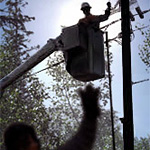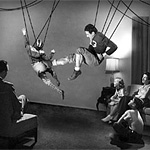 When I awake there’s shouting, and for a moment it’s 1983, and I’m back at the Institute holding an oily rag in one hand and a canteen of gasoline in the other. Then I remember that they never got any charges to stick, and I shake the remnants of sleep from my skull.
When I awake there’s shouting, and for a moment it’s 1983, and I’m back at the Institute holding an oily rag in one hand and a canteen of gasoline in the other. Then I remember that they never got any charges to stick, and I shake the remnants of sleep from my skull.
“Fucking kidding me!” comes the voice from outside. I roll out of bed and go to the kitchen window, squinting through the grit in my eyes. Indistinct white shapes coalesce into a truck parked at the opposite corner. A man beside it, working with his hands. It’s a PG&E truck. Another man high up in the bucket at the end of a crane boom, amid the wires.
Some of their words are lost over the diesel churn, but the yelling comes across just fine. “You fucking jimmied it?” Thirty feet up, the man in the bucket tugs at his control panel uselessly. The guy on the ground did jimmy it, apparently. I wasn’t even aware that people still jimmied anything, but I’ve been letting such things pass me by lately.
“Look, Jack,” says the ground man, “… been something … talk about, … gimme a second, okay?”
The man in the basket rips off his hard hat and throws it at his familiar, who dances out of the way. “No. No, you unlock this shit right now, man. This is bullshit.”
“Or what? You gonna write about it in your blog?” The man on the ground makes finger quotes for the word “blog.”
Basket man is incredulous, his hands out in an open question.
“Yeah, now what?” continues ground man. “… think … secret? How long did you think … putting me in your blog?”
I can feel my face muscles bunching up against the unrelenting sun, and I withdraw into the relative dim of the kitchen, and the tension unreels like a loose kite. I remind myself that I’m supposed to be ignoring things like this. The fact is that it’s becoming more difficult isn’t because I’m not getting better at ignoring things–I am. No, it’s because stranger and stranger things are happening to me. It’s like I’m being tested to see just how much I can ignore.
It all began with a simple goal: to concentrate. It followed that any concentration that I was able to achieve while others were distracted put me ahead of the game a little bit. Added to my power, whatever. It seemed natural that this was a worthwhile endeavor, so I started by ignoring the most obvious things.
I simply filtered them out, the car alarms, babies crying, sirens, and traffic accidents. It was easy. These are things that anyone can ignore, provided they have to urinate badly enough. More of a struggle was ignoring glass shattering against the wall, bones snapping like twigs, and gunfire in my left ear loud enough to cause an extended ring. But before long I registered these disturbances only as part of the ongoing whisper of ambient sound, and my emancipation from the sonic gestalt seemed complete.
But things got stranger then, as if some universal dynamic were compensating for my newly fortified filter. A woman wearing only a mesh of red latex spikes served me complimentary lemonade at a benefit for people lost to Burning Man in the wake of the dot com bust. I resisted. A man named Thigpen Proulx set up camp on my front lawn for an entire week. My inattention was absolute.
But now this. The men outside are still shouting at each other, one above and one below, as if in a kind of reenactment of Romeo and Juliet gone horribly wrong. And should I not be ignoring this too?
I never really acquired a taste for solipsism, but I seem to have found my way unwittingly to the center of something. Is this attention–this responsibility–something I’m required to bear as a penalty for a tactical neglect cultivated to glistening perfection? Is this what it comes to, this… insistent plea? Is reality as we know it nothing more than a spoiled child vying for our individual attention?
Sometimes I sit in wonder that things are and continue to be. Surely the molecules that make up the myriad forms around us will at any moment fly into a caustic soup. The more I ignore the things around me, the more I feel reality’s need for acknowledgement. It hums all around me, imminent, and myself at its center. A flash, and I’m blasted by fine hot pins, and the push and suck before eardrums rupture, before the ground goes out beneath me, before the feeling of falling forever.
And then I’m back, before it all happens. The thought of it is a joke. A threat. A promise.
No one said life was easy, that’s what it comes down to, and if I’ve noticed any queer escalation then it stands only as a mark of my own imminent invincibility. I think I’m on the right path, and the universe is feeling threatened. This is the bed I’ve made, and my determination to ignore that fact must be unwavering.
 Having returned from my interpretive dance motion capture session in Brussels, and with an extra free week on my hands still, I have decided to spend my time on a new campaign to urge the medical community to perform a new kind of cosmetic surgery. This is the text of my letter.
Having returned from my interpretive dance motion capture session in Brussels, and with an extra free week on my hands still, I have decided to spend my time on a new campaign to urge the medical community to perform a new kind of cosmetic surgery. This is the text of my letter. Back in the early forties–1946 was when it all started for us–kung fu by wire was an art form in its infancy. In fact it’s fair to say that it wasn’t yet an art form, but rather a humiliating form of family torture. At least that’s how I remember it.
Back in the early forties–1946 was when it all started for us–kung fu by wire was an art form in its infancy. In fact it’s fair to say that it wasn’t yet an art form, but rather a humiliating form of family torture. At least that’s how I remember it.